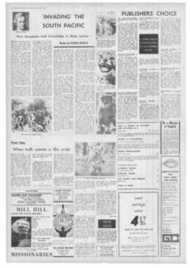Page 1, 21st January 1966
Page 1

Report an error
Noticed an error on this page?If you've noticed an error in this article please click here to report it.
Tags
Share
Related articles
Strengthening The Viaduct
Welcoming The Methodists
Dr Runcie Warms To 'second Spring' Of Ecumenism
Heads Of 30 Churches Join Cardinal Hume For Service
'hard Work Ahead' —cardinal
NOW FREE CHURCH DIALOGUE PLANNED
CARDINAL HEENAN, who is making ever-increasing contact with Anglican Church leaders in Britain, is to step up his "dialogue" with heads of the Free Churches. As part of his "all fronts" unity drive he is to meet leading Free Church clergy and laity at a private dinner party being organised by Tory M.P., Sir Cyril Black.
He told a "welcome home to the Hierarchy" rally of 3,000 Catholic laymen in London's Royal Albert Hall on Sunday that so far the Catholic Church's ecumenical efforts in Britain have been one-sided.
They have been confined almost exclusively to one section of the Church of England—its High Church, he said. The time has now come to seek friendly exchanges with the whole of the Anglican Church and the Free Churches.
The fact that the Low Church of England and the Evangelicals know little of Catholics—and Catholics little of them—and have less taste for ritual and vestments, did not make them any less acceptable partners in dialogue, he declared.
Moderator's welcome
The Rev. Peter McCall, Moderator of the Free Church Federal Council, commenting in Bristol this week, on Cardinal Heenan's ecumenical drive, said Free Churches would welcome any move to bring them to a closer understanding with Roman Catholics.
"Nothing but good can come from Sir Cyril's dinner party," he said, adding that at all levels Christians were asking questions of one another. and in that way coming closer together.
In his addresses to the Albert Hall Rally, Cardinal Heenan said Catholics must not think of themselves as segregated nor regard other Christians as rivals. They should regard their fellow Christians as brothers in Christ.
'Narrow' view
Describing as "narrow" the view of people who see no good in ecumenism because a reunion of Christians may take 100 years or more, Cardinal Heenan said union is the ultimate end, but unity is already present.
He said Christians could have unity of purpose without complete identity of doctrine, and already Anglicans and Free Churchmen were going hand-in-hand with Catholics to put educational proposals before the Government.
"The Pope and the Council invite us all to work for Christian Unity and I know that you will take up this apostolate with zeal," he added.
Turning to Catholics within the Church in Britain, he said that bishops have drawn closer to the clergy and laity as the result of Vatican II. Each has special duties to perform. If bishops neglected their work nobody would do it for them. Neither could a priest do a layman's work. The Council had taught Catholics not to criticise but to help ... not to talk but to act_ He said Sunday's great gathering of laymen at the Al pert Hall was a sign of the beginning of anew apostolate of co-operation between clergy and laity.
Acknowledging the warm welcome to the Hierarchy, Cardinal Heenan said now that bishops were back from Rome they would be implementing the policy of collegiality.
"British Catholics will hear how clergy and faithful will march together," he continued, adding that in every diocese priests and laymen will be appointed to advise the bishop and help in the administration of the parish.
The rally, organised by the Catholic Young Men's Society, was attended by 23 bishops, including Archbishop Cardinale and several missionary bishops.
They were welcomed on behalf of the C.Y.M.S. by Mr. James Quinn, who told them: "We are your men, members of the Church and proud to be so." The meeting started with the singing of the Creed and ended with a blessing from all the bishops.
In one of the speeches of welcome, Dr. Joan Brothers, a sociologist, and the only woman officially present, noted the emergence of new attitudes in the -Church. The legal, objective approach had given way to a more outward-looking one.
One example of this concerned praying with the separated brethren. The more that Catholics prayed with them the more they felt the pain of sacramental separation.
She thanked Cardinal Heenan for his intervention on behalf of the Jewish people at the Vatican Council and urged the rooting out of all remnants of class and racial distinction.
Critical look
Among barriers to the aggiornamento were attitudes within the Catholic body itself. Catholic organisations would have to be looked at in a more critical light, she said.
Supporting Dr. Brothers, Mr. Donald Nicholl expanded the dual theme of freedom and personal responsibility. Quoting Pope Paul, he said it was not enough to recall the social doctrine of the Church in an abstract way; it had to be applied to the situations as they gradually presented themselves.
He contrasted the thousands of millions spent in 1964 on cigarettes, drink, cars and gambling with the £2f million donated to Oxfam, whose income fell during that year.
blog comments powered by Disqus











